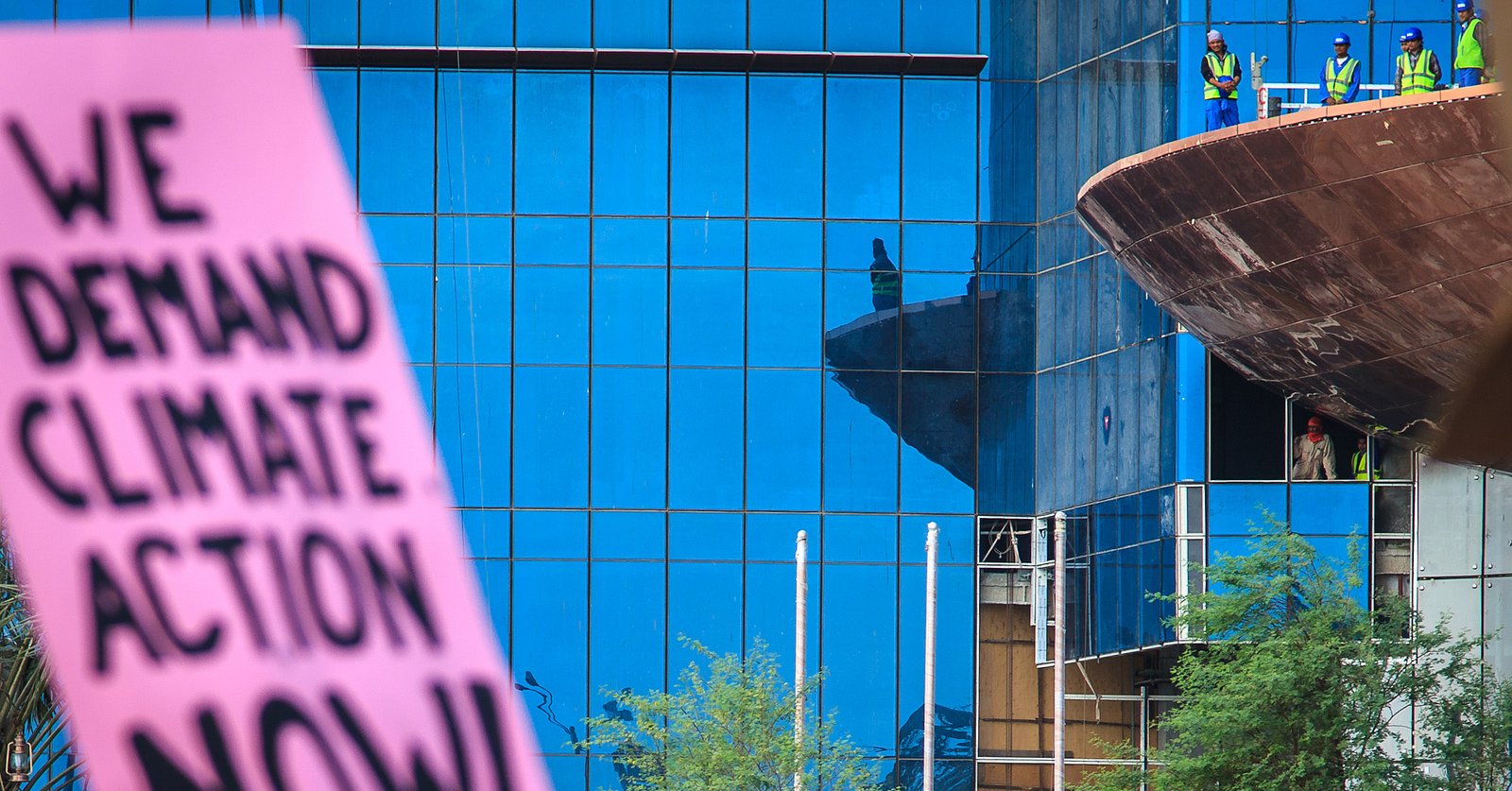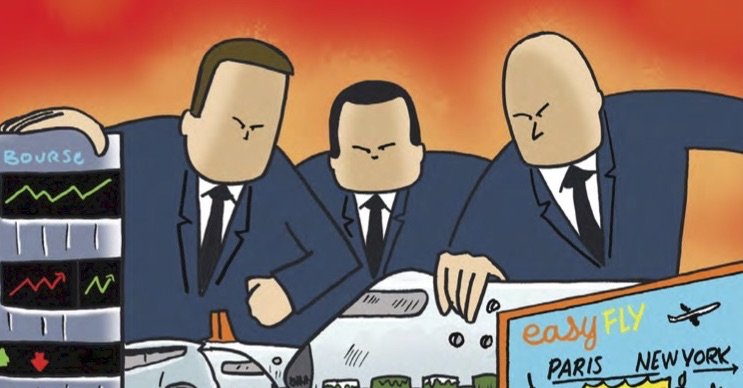ITUC has been actively involved in the international climate debate for many years, calling for a ‘just transition’ – one that does not leave workers behind. What is your assessment of COP21 and its outcome?

COP21 set a global framework. It was never going to be the ambitious treaty that the world attempted in Copenhagen, but it is legally binding. Of course, there are several areas around which we would have liked to see much stronger commitments, such as the financing commitments, which are still inadequate, and the national contributions – the so-called INDCs. If the INDCs are not revised in 2018, it will lock-in many of the current low ambition targets until 2030, which will leave us on a warming trajectory that will go well beyond 2ºC.
Another area of concern is the lack of national plans to implement the Paris agreement. You can argue whether the objectives put up by nations or by the European Union are ambitious enough, but, looking beyond that, most nations don’t have a plan to meet these objectives. Apart from a few examples, such as in Germany because of the shift from nuclear, or in Scandinavia, there’s not much evidence that nations are really thinking seriously about developing a national climate plan, and even less so one that is based on social dialogue and includes provisions for what we call a ‘just transition’. Around the world, there’s only one country that has a multi-stakeholder committee on climate: Senegal. It’s one of the poorest countries in the world, but at least they know they have to have everybody engaged to develop a plan for the future to realise a zero carbon world - but also a zero poverty world, through the “Sustainable Development Goals” (SDGs).
In 2015, the world actually reached two historical agreements: one on the SDGs and one on climate. This global ambition now needs to translate into national ambition and action. For unions, the way forward now is to implement the call for a just transition. We’ll be asking all governments and employers, both at enterprise and sector level, for dialogue around the development of national plans, to look at how we transition from fossil-fuel based dependency to renewable energy.
Do you consider you got a positive response from companies on that subject at COP21?
Not yet. Business and investors were present at COP21 in much larger numbers than at any time previously, and some of them are sincerely committed to the transition. But I don’t think the fossil fuel companies and the big energy companies realise that the timeframe for transitioning is very short. They’ll either have a plan to remain significant corporations in the future, or they will fall by the wayside. In particular, I don’t think big energy companies have realised that the models for energy supply are changing, and that other areas of business now have choices around self-sufficiency of energy supply that they didn’t have in previous decades. Already, in the current context of low oil prices, investors are taking their money out of these companies and jobs are lost. Unless there is a serious plan for transition, the big energy companies will become vulnerable, and so too will workers and the communities who’ve been dependent on them.
How do you view the role of the climate movement and the greens in that respect? Workers and unions often express frustration that environmentalists simply call for divestment or for putting an end to coal, without talking about what that would involved for the workers.
At global level, we have built a very strong alliance with the big green and development groups on the climate issue. There’s no doubt they understand the need for a just transition. We have supported disclosure of carbon risk by companies, and we do understand the objectives of the divestment movement, that has grown out of frustration with these companies. We would say that if any company refuses to have a plan for decarbonisation and preserving jobs with a 2 degrees impact or less, ultimately they are targets for divestment. Without a shift in their energy mix and without capacity for skills and redeployment, we’re going to see not only companies becoming vulnerable, but whole communities becoming vulnerable. That is already happening with coal companies going bankrupt in the US.
How easy is it to pass on this message on climate and transition among the local unions, particularly unions in the fossil fuel or big energy companies, that often have some of the strongest unions?
We’ve been campaigning for a just transition for a decade. Finally, the Paris agreement includes a commitment for just transition. But would I tell you that people are not frightened? Of course they are. Many of these jobs are good jobs. They’re jobs with strong collective agreements. They’ve been the backbone of many communities. And they have in many ways built the prosperity of today. So we demand respect for the fossil fuel workers, that they be engaged, through dialogue, that their fear is actually overcome with a plan that gives these people, their families and communities hope. And that is where governments are totally failing, with the exception of one or two.
There have been a number of issues, such as the Keystone XL pipeline, where the union movement was divided, with some unions backing the greens and some of them, mostly in the industry or building sector, backing the fossil fuel companies.
We’ve seen this in the US, in Canada, in Central and Eastern Europe. The Keystone pipeline was actually a battle about jobs. This is where government fails. If government had put up an alternative that offered the same amount of jobs and said ‘Which one would you choose?’, things would have been very different. When there is a plan and you can see the future, people have hope, and fear is not driving people to say no to change. When you have no plan, there is no hope, and fear is extraordinary.
Our job now is to demand a dialogue between employers and unions, to make sure working people have a clear view of the future of their jobs. We say very clearly that our grandchildren may very well work in energy, but they won’t work in fossil fuels. This requires a national commitment to frame the dialogue, and ultimately then a national plan. Within that context, companies have a choice. If they want to be part of the future, they will need to be absolutely committed to working with workers. In Europe, it’s not that hard, you have work councils and a social dialogue tradition.
Would you say the failure of governments is also the result of privatization policies, since governments have lost the control of their national energy systems?
I think that is too easy an answer. Certainly privatization hasn’t served us that well, but many of the companies we’re talking about are still state-owned. In some cases, they’ve been managed quite well. Others have become very institutionalised in a mindset that is not allowing them to transition rapidly enough to a renewable energy mix. It’s the same in the private sector, where we also see companies that are very short-sighted. And when a company actually developed a transition plan, as was the case with US company NRG, it is the board and investors that proved short-sighted. The CEO was fired and the board decided to separate the renewable energy and the fossil fuels assets, which will inevitably become targets for divestment. Companies need to have plans for some sort of orderly shift towards the future, with a transparent plan, where people can see the progress. But, with a few exceptions, it’s not happening. When most investors look only at their rate of return over a couple of months ahead, it’s not even possible.
You mentioned the European social dialogue tradition. Do you think it will be sufficient to drive a ‘just transition’, considering the huge imbalance of power between workers and communities on the one hand, and investors and executives on the other? How do you ensure workers do not always ultimately pay the price of the transition?
We are demanding that the ‘just transition’ plans involve some sort of job security, with time-bound commitment to jobs, as well as commitment to pensions and investment in skills and redeployment. On top of that, we are also calling for a just transition funding – for instance a percentage of funds levied through carbon pricing – to secure jobs and provide support to working people and their communities.
Donate
Independent information on corporate power is critical, but is has a cost.
DonateWill the renewable energy sector ever provide the same quality of jobs that was historically the norm in the big energy companies?
It’s our job to organize workers in the renewable energy sector to ensure they have quality jobs. There’s no reason for them not to. These are skilled jobs. We’re organizing hundreds of thousands of people in the renewable energy sector, and we’re formalising jobs in sectors that were once seen as the worst of informal activity, for instance waste pickers, who can become the foundation of the circular economy.
In the run-up to the World Economic Forum in Davos, you have released a report calling attention to the ‘hidden workforce’ of global companies, showing that for instance while Carrefour has officially about 300 000 workers globally, which is already a lot, if you take into account their whole supply chain, actually it has 3 million workers, 90% of which are not direct employees. How can the union movement deal with this reality?
We’ve released the first iteration of the Scandal report to show that the global economic system is unsustainable. Multinationals make the enormous profits they do thanks to a workforce that is totally dependent on them, but largely invisible: on average, only 6% of this workforce are direct employees of these companies. In a majority of cases, it’s a low-wage, precarious work environment, often unsafe and with terrible conditions, including informal work and forced overtime. That’s not a moral compass that anyone can accept, and that’s not sustainable. I have walked the factories of these supply chains: you can’t see the conditions in those factories and not know that you could take the CEOs of multinationals to see some of it, they’d be horrified.
The global GDP has tripled in the last 30 years, and yet we have seen a slumping global income, and an inequality that is actually now a global risk in itself. Take even a minimum ambition, such as the living wage. There is a fight in Indonesia right now on that issue, and they’re talking about a minimum wage deficit of between 25 and 50 dollars a month. It doesn’t sound much to Europeans, but for them that’s the difference between living in dignity and bringing up you family in an environment of poverty. Sensible businesspeople, such as Paul Polman, the CEO of Unilever, say their markets are shrinking, and that the only way for them to expand their markets for consumables is basically to make sure people have the income to pay for it. Even apart from the human rights and decent work that we would fight for, the reality is that the current economic model is unsustainable in itself.
How do we change this?
We at ITUC have identified three ‘frontlines’: one is climate, the other is this one, looking at multinationals’ supply chains under the banner ‘ending corporate greed’, and the third is about eliminating slavery, particularly, but not only, in the Gulf states.
Multinationals must be held to account for fundamental rights and safety at work across borders. Governments and international organisations can make a difference. The OECD is now developing a standard on due diligence. If that is successfully negotiated, we’ll be calling an all governments to mandate it, so people can prosecute companies where they’re failing in that regard. Angela Merkel has taken a real leadership on this and put it on the G7 agenda last year. The UN Treaty project is a longer-term piece.
We are also very interested in the French legislative process to mandate due diligence. This legislation, despite the fact that it’s been watered down, is groundbreaking. If we could see progress in a only a few European countries around mandating due diligence, it would shift the model, not just for situations like working conditions in Qatar, but also around the responsibility of multinationals everywhere. The judicial procedure against Vinci in France is groundbreaking, and we think there’ll be many more, even within the current legislative framework. In fact, we’re doing the mapping for identifying new cases right now.
Is the international union movement prepared to deal with the shifts in the global balance of power? How do you approach countries such as China or Russia?
You’re talking about two very different situations. China may feel vulnerable now, but they have a strategy for developing domestic market that is about increasing wages and the social protection of their citizens. Are they a democracy? No. Do we organize in China? No. But it is our Western companies that actually went to China so that they could actually pay poverty wages. The American Chamber of Commerce opposed labour rights in China. When our companies behave in that way, something is really wrong, and our governments refuse to acknowledge that.
With Russia, the issue is rather one of peace and security. Russian workers are victims of the current tensions, because the economy is collapsing, and because the sanctions, while they may be understandable in a geopolitical sense, are hurting them. In that sense, just as Chinese workers are the victims of our own corporations and of their own government’s ambitions, so are Russian workers the victims of a geopolitical situation they did not create. The same could be said of the Middle East: in each case, much of the current environment can be traced back to the geopolitical decisions of Western leaders over decades. We have to have a bigger vision of a world, where people matter, where rights matter, and where peace and democracy are fundamental, irrespective of commercial interests.
The far right is targeting workers at the moment, particularly around the issue of migrants and refugees: in the US with Donald Trump, in France, and in many countries in Europe. What is the role of the unions in that context?
We have to talk to working people, talk about what they want for themselves and their children, and why that shouldn’t the same for other people. Again it comes down to fear. Donald Trumps is a crazy man, but simplistic claims are tapping into the fears of working people. You can blame all political parties for this. When a political party wants to build its own basis of power off the back of indicating that somehow someone from another country or another religion is less then you are and can be treated without commitment to human rights, you don’t deserve to be in power. If progressive politicians want to have a future, they have to be able to engage with working people.
It’s a ‘sons and daughters’ test. To CEOs I say: do you want your sons and daughters to work like this? No. Then don’t allow your companies to treat other peoples’ sons and daughters as less than human. It’s the same for politicians, and we have to have that same narrative in our communities and among working people. There are already many wonderful communities around the world, communities who say they are willing to take refugees. Unions have always been a counter-voice, and we will continue to be. Unions have always been the bulwark for democracy. If you want to build democracy, you allow for unions and you build a narrative of making people’s lives better. If you want to destroy democracy, you attempt to destroy unions.
Interview by Olivier Petitjean.
—
Photo : Omar Chatriwala CC




